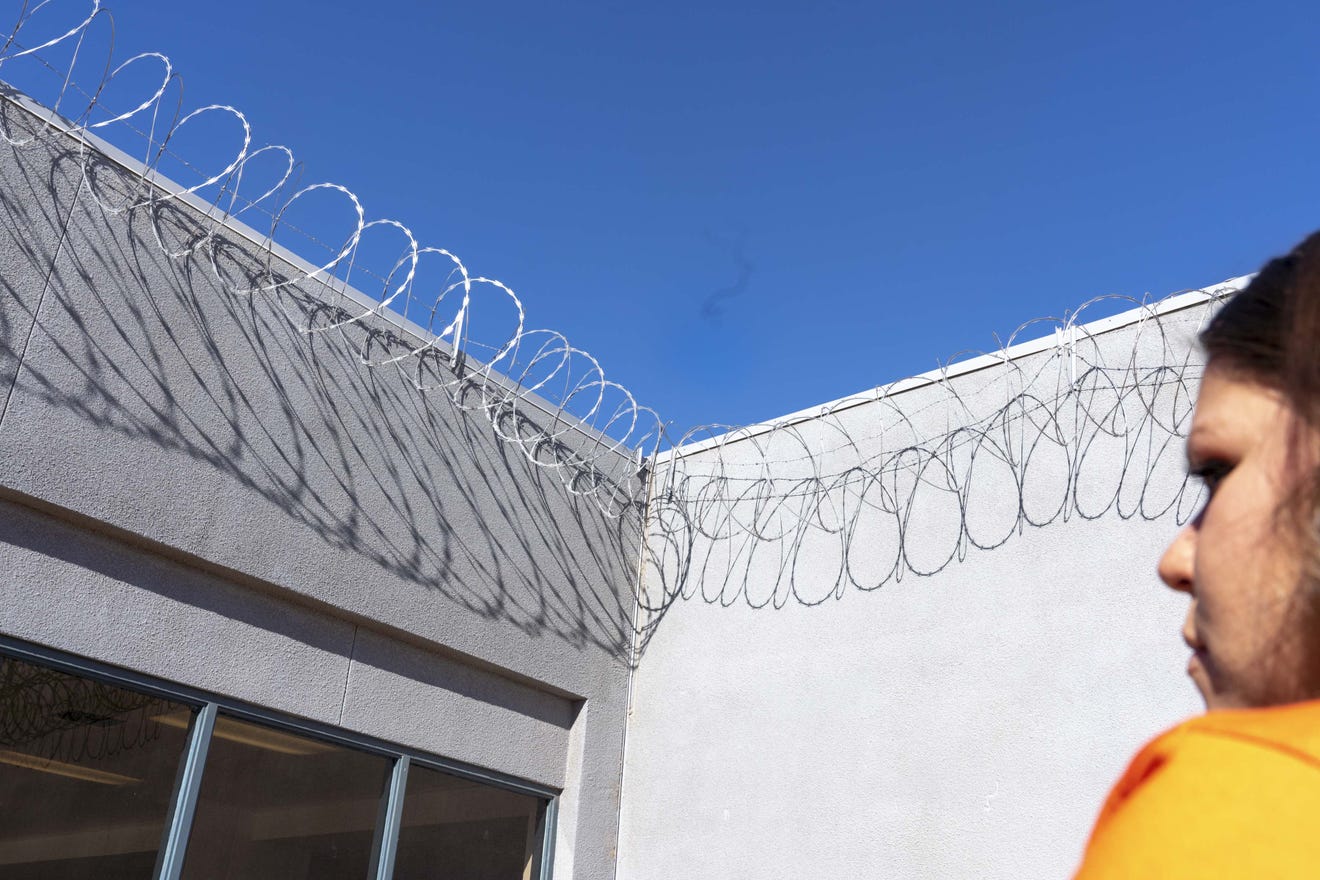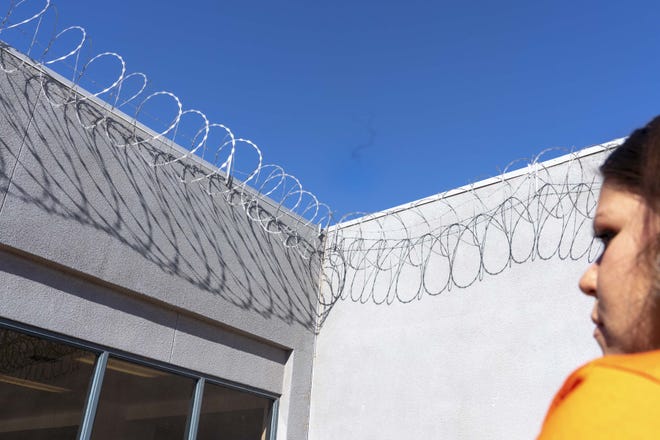A few females imprisoned in the Arizona Division of Corrections whilst pregnant claim their labor was induced from their will.
The females say they were compelled to have their labor induced, in spite of seeking to have a spontaneous birth. The Arizona Section of Corrections did not affirm or deny their accounts.
The promises shine a light-weight on a lack of transparency all over birth insurance policies and, in some states, a absence of plan completely.
Advocates for incarcerated females have sounded alarms nationally about what they say are human rights violations taking place right before, all through and after beginning, together with the shackling of laboring mothers and the early separation of moms and babies — both equally of which are illegal in Arizona. Medical practitioners say inducing labor really should only be finished with the educated consent of clients.

Professional medical records reviewed by The Arizona Republic present all 3 women of all ages were being induced right before their thanks dates. The females consented to have their professional medical information unveiled. Stephanie Pearson and Desiree Romero experienced their labor induced at 39 months gestation in 2022. Jocelyn Heffner was induced in the 37th week of gestation on two individual occasions during individual incarcerations in 2020 and 2022.
Investigation has revealed that labor can be induced properly at 39 months if it is an elective procedure, and overall health care authorities say labor can safely be induced in advance of 39 months if there is a clinical reason to do so.
But all 3 girls claimed they were being instructed by jail professional medical providers they were getting induced mainly because it was a policy of the Arizona Division of Corrections for all pregnant incarcerated gals, not thanks to their person situations. The women say they were being provided no clarification for the plan.
The Arizona Section of Corrections did not reply to several requests for comment. NaphCare, the state’s prison well being treatment contractor, denied possessing a coverage of compelled inductions. NaphCare’s contract commenced on Oct. 1, 2022.
‘THEY TOOK NO ACTION’: Colorado woman files lawsuit after prison online video shows her offering start by itself in jail
Centurion, the previous prison well being treatment contractor, did not respond to inquiries about the ladies who declare their labor was induced towards their will in the course of that company’s tenure in Arizona.
All 3 women of all ages who spoke with The Republic said they ended up told their labor was going to be induced and were not supplied a preference.
“They reported they induce absolutely everyone for the reason that they you should not want anybody heading into labor below,” Stephanie Pearson mentioned of the rationalization she was offered by a prison obstetrician. “They just advised me that anyone on a diverse garden a couple of years back went into labor in their cell, and had their child in the cell, and that is why they induce absolutely everyone now.”
In 2019, attorneys from the Jail Legislation Workplace and ACLU documented an occasion of a seriously mentally ill girl supplying beginning, by yourself, in the rest room of her mobile at Perryville. The attorneys uncovered the woman experienced been sent to the healthcare facility right after her drinking water broke, only to be returned to the jail for unfamiliar explanations ahead of supplying start.
COUNTY SETTLES Suit:A pregnant inmate went into labor, and then her little one died. Was a Starbucks halt to blame?
Desiree Romero reported she was advised consistently by the Office of Corrections professional medical company that it is a established plan to induce all pregnant prisoners a single week in advance of their owing date.
“They induce us all now so that we don’t go into labor in jail,” she claimed.
Romero mentioned she under no circumstances had a option in the issue. If she did, Romero suggests she would have waited to have the little one spontaneously.
“I’m rather used to the prison producing all these conclusions for us for the reason that we are nonetheless point out assets,” she reported.
“I felt like I was considered as a legal responsibility and strolling all around a prison yard 9 months expecting did not ease and comfort this point out establishment,” claimed Jocelyn Heffner. Heffner claimed she disputed the decision to induce her labor for the duration of two pregnancies whilst at Perryville, only to be denied each and every time.
“Most girls get induced right here, I’ve caught on to,” she mentioned.
Decline of autonomy
All medical techniques in the United States, together with induction of labor, should really come about only with the patient’s entire consent, reported Dr. Laura Mercer, associate professor of obstetrics and gynecology at the College of Arizona University of Medication in Phoenix.
Mercer stated it was about to discover there ended up incarcerated patients who reported they did not know why they ended up being induced.
“Informed consent is an moral prerequisite,” Mercer reported. “From a health care point of view, we owe it to our patients to make absolutely sure that they are entirely informed about what we are recommending, why we are recommending it, and what the choices are.”
When Mercer stated there are valid health care factors, like higher blood tension, for wellness treatment providers to recommend induction, sufferers should even now have the autonomy to decline procedure, even if that decision success in dangers to their health and fitness or the health and fitness of the fetus.
Kierra Otis is a total-spectrum doula and co-founder of the Rooted Doula Collective in Arizona. She says if the women’s allegations are legitimate, a policy of compelled induction would “absolutely be a human rights violation.”
Otis explained the reduction of autonomy for the duration of being pregnant can increase to the problems of what she named a incredibly tender time period in a person’s daily life, physiologically and hormonally.
“People can be truly vulnerable when they’re likely through these situations,” Otis explained. “And so it is actually critical that they have as much management around the circumstance as they can.”
Pearson claimed she didn’t like the conclusion becoming created for her “especially for the reason that they did not clarify any of the pitfalls to me.”
“Just for the reason that I built some negative alternatives in my life, they shouldn’t be allowed to make bad well being alternatives for me and my baby,” she reported.
Physical and psychological trauma
Otis stated the decline of autonomy can also have impacts further than the being pregnant.
“I’ve observed, as a doula, when persons feel that they have a selection in the make a difference, there is way less trauma,” she reported.
Whilst the ladies who spoke to The Republic consider their young children are wholesome, they say the decline of autonomy in the final decision-making system extra to an already stressful and painful health care method and led to greater signs of postpartum despair.
All of the females noted suffering from labor for a long time just after they were being induced, up to a couple days.
“It will make your system do one thing it can be not all set for, and the child just isn’t all set for,” Pearson stated. “It stresses the toddler and the mom out.”
Pearson stated her previous encounters with spontaneous labor lasted only a handful of hours, but the jail-induced labor took just about a few times.
“It’s a whole lot a lot more energetic labor, which signifies a large amount more contractions, and more durable contractions,” she said. “After the beginning, I was in so significantly more pain than my other types, and it took a good deal extended for my overall body to mend.”
Desiree Romero claimed her pressured induction lasted two times.
Arizona not next state law or finest tactics, ladies allege
Arizona handed a variation of the Dignity For Incarcerated Gals Act in 2021, supplying some safeguards for pregnant people today in point out prisons. In addition to making certain satisfactory amounts of feminine cleanliness solutions are out there to girls at no demand, the legislation also prohibits shackling of expecting prisoners all through labor, involves suitable prenatal care, and mandates the mom be ready to spend 72 several hours with the newborn immediately after the birth.
More:She gave start in shackles, received an charm, but still waits for justice
Though the ladies who spoke to The Republic said they were being not shackled and had been specified the allotted time with their baby, they claimed the division was not furnishing enough cure for them during and immediately after the being pregnant. The Dignity Act does not include precise aspects of labor for incarcerated women of all ages. Two of the women of all ages interviewed experienced in no way read of the legislation and mentioned it was never defined to them.
Pearson stated she was denied breast pads after the birth. All three women explained their exclusive prenatal diet only consisted of an extra serving of milk every day, and sometimes a peanut butter sandwich.
Two of the ladies claimed they were being acquiring healthcare bills for the providers furnished in the course of their labor — inspite of the Office of Corrections and its contractors’ bearing the money accountability — a popular grievance voiced by folks incarcerated in Arizona prisons.
The U.S. House of Representatives past month passed the Pregnant Women in Custody Act, which aims to improve protections for expecting prisoners by, among the other points, putting limitations on solitary confinement for expecting prisoners and necessitating the federal Bureau of Prisons to give enhanced screening and prenatal treatment.
A spokesperson for the BOP reported whilst it does not have a plan in regard to inducing labor in expecting girls, “if there is a health-related requirement in inducing labor, care would be coordinated with community hospitals and their respective professionals.”
The California Division of Corrections and Rehabilitation did not react to particular questions about inducing labor, but the agency’s treatments have an total portion on “Patient Care Throughout Being pregnant and Childbirth,” which outlines steps to be taken to transport ladies in labor to the hospital.
A spokesperson for the Texas Section of Criminal Justice explained the company does not have any procedures on the induction of labor of expecting prisoners, “as it is not carried out on TDCJ models.”
“The induction of labor is a scientific conclusion made by the attending obstetrician at the clinic,” the spokesperson stated.
The Arizona Office of Corrections’ Medical Provider Technical Guide makes no point out of labor induction in the portion on “Counseling and Care of the Expecting Inmate.”
“It’s yet another instance of how professional medical tactics are dictated by the deficiency of wellness treatment and custody workers,” explained Corene Kendrick, an lawyer with the ACLU nationwide jail project. Stability and healthcare personnel have reported dangerously reduced staffing levels in Arizona prisons for many years. “If they had adequate nurses and custody officers on-web-site 24/7, they could employ best techniques.”
Dr. Carolyn Sufrin, an OB-GYN and researcher at Johns Hopkins Faculty of Medication who research incarcerated women of all ages and reproductive wellbeing, said best techniques for prisons that household pregnant girls entail close interaction in between safety and health care employees. Employees ought to be experienced to “not distrust women’s reviews of contractions and bleeding and other labor signs,” Sufrin reported.
“Because they are incarcerated, so substantially of their autonomy has been taken from them, and possessing some say in the ailments of their start, I assume, is seriously essential,” Sufrin explained. “And that’s part of shared final decision-making, which is a principle that we make use of in obstetrics. Something that they can medically, fairly have some perception of company and control over, is one thing that can enhance their perception of perfectly-getting.”
Have a information idea on Arizona prisons? Reach the reporter at jjenkins@arizonarepublic.com or at 812-243-5582. Comply with him on Twitter @JimmyJenkins.






